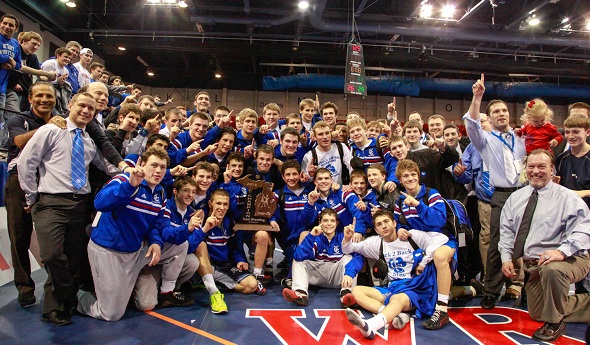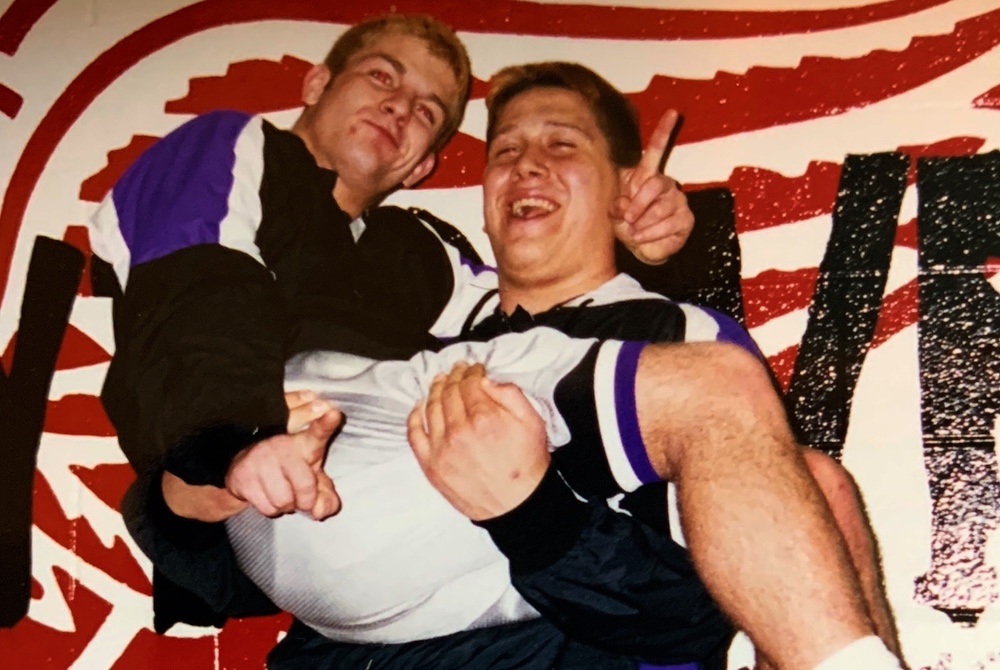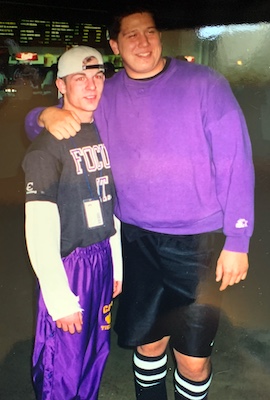
Shamrocks Make it 10 with D1 Repeat
February 23, 2013
By Greg Tunnicliff
Special for Second Half
BATTLE CREEK – Rematches are always fun.
But they don’t get any better than when they are between the top two teams, and in the MHSAA Finals.
Detroit Catholic Central, ranked No. 1, and Davison, ranked No. 2, met for the second time this winter in Saturday’s Division 1 championship match at Kellogg Arena in Battle Creek.
The highly-anticipated rematch lived up to its billing, with the Shamrocks pulling out a thrilling 29-26 victory when junior Evan Toth earned a pin at 125 pounds with 36 seconds left in the third period.
Toth trailed 9-2 before he successfully put a headlock on Davison junior Derek Humphrey, turned him over, and recorded the six-point victory to send the Shamrocks’ bench and many of the capacity crowd of 3,618 into a frenzy.
Coincidentally, Toth lost to a wrestler from Oxford in the last match of the 2011 state finals. The Wildcats beat the Shamrocks 26-25.
“I’ve been in that situation before,” Toth said. “I knew we needed more than three points, and I was looking for something big the whole match. I knew what I had to do. You have to wrestle the whole six minutes. (Winning the championship) is the highest high you can have.”
It is DCC’s second straight MHSAA title and 10th overall. The Shamrocks ended this winter 25-3.
“I’m at a loss for words,” DCC coach Mitch Hancock said. “(Toth) never gave up. When you’re a Shamrock you believe to the end, and he did.”
While the Shamrocks were overjoyed Saturday, Davison’s contingent was stunned. The Cardinals led for most of the match and appeared to be headed for their first MHSAA title since 2006 when they took a 26-23 lead on 3-1 decision by Lincoln Olson at 119 pounds.
Humphrey got off to fast start at 125 and controlled the majority of the match, leading 4-1 after the first period and 9-2 after the second.
Davison ended this season 14-5.
“It’s heartbreaking,” Davison coach Roy Hall said. “That kid (Toth) found his position. He had one opportunity to hit a home run.”
In a star-studded Division 1 lineup that featured eight teams that had won a combined 34 team championships, it was no surprise that Davison and DCC faced each other in the Final.
Entering this weekend’s final round of the state tournament, the Cardinals and the Shamrocks boasted a combined 17 MHSAA titles and three runner-up finishes. Both teams featured a combined 21 ranked wrestlers.
DCC and Davison were the top two seeded teams, with Catholic Central at No. 1 and Davison No. 2. Both squads more than lived up to their lofty billings by demolishing their quarterfinal and semifinal opponents.
Davison defeated Holt, 50-12, in Friday’s Quarterfinals before polishing off third-seeded Hartland, 44-15, in Saturday’s Semifinals. The Shamrocks beat eighth-seeded Grandville, 62-7, before downing fourth-seeded Rochester, 48-13.
Davison started out Saturday’s championship rematch in much better fashion than its first encounter with Catholic Central, a 44-23 setback on Dec. 14.
Saturday’s match began at 130 pounds and Davison captured the first five weights to take an 18-3 lead. DCC was able to get back into match, primarily, because of the performances of its heavyweights.
The Shamrocks captured four straight weights from 171-285, recording back-to-back major decisions at 171 and 189 and a pin at 285 by senior Bob Coe that gave Catholic Central its first lead at 20-18.
“The whole year we didn’t talk about repeating,” Coe said. “Now that it’s done, we can talk about a repeat. I firmly believe we have the best coaching staff in the country and the hardest-working team in the country.”
One of the big reasons Davison was able to stay with Catholic Central and nearly win was the return two-time individual champion Justin Oliver and the performance of freshman Max Johnson.
Oliver did not compete in the Cardinals’ first match with the Shamrocks, and they both recorded key victories Saturday. Oliver opened the match at 130 by recording a 3-0 victory over Myles Amine, giving the Cardinals a 3-0 lead.
After Catholic Central came and took the lead, Johnson gave Davison the lead back at 23-20 with a technical fall victory, 15-0, over the Shamrocks’ Tommy Herrimann at 103 pounds.
“Justin Oliver is a two-time state champion,” said Hall of Oliver, who returned to the Cardinals’ lineup at the team District tournament. “He is a stud and he lights up an athletic event. I was happy with the effort. That’s all you can ask for. Our guys will be back.”
The Cardinals almost put a huge distance between themselves and Catholic Central when Jacob Madrigal nearly pinned Parker O’Brien at 112 pounds.
Trailing 4-2 with less than 10 seconds left in the third period, Madrigal flipped O’Brien over and came seconds away from securing a pin before time expired. O’Brien took the victory and tied the match.
“I went a little too quick,” O’Brien said. “I went for two points (takedown) and I got a little sloppy. I just held on for the win.”
The loss was only the Cardinals’ third to a Michigan team this season. Besides Catholic Central, the only other Michigan squad to beat Davison was St. Johns, which beat Lowell, 42-20, in the Division 2 championship match.
“It’s very tough,” Hancock said of having to face Davison again. “We knew they were a much better team than we faced in December. Anytime you have (Davison’s coaches) Roy Hall and Paul Donahoe in a corner, you’re in for a war. We persevered.”

Caro Champs Find Common Ground Again as Mental Health Providers
By
Paul Costanzo
Special for MHSAA.com
July 8, 2021
Phil Millerov and Phil Niklowicz wanted to do more than simply defeat opponents when wrestling at Caro High School.
They wanted to dominate – physically and mentally.
 “We had this thing between us where we wanted to be done, and (opponents) didn’t want to come back on the mat with us,” Millerov said.
“We had this thing between us where we wanted to be done, and (opponents) didn’t want to come back on the mat with us,” Millerov said.
Twenty years later, both spend their days building people up. Millerov is a licensed professional counselor, while Niklowicz is a licensed therapist.
“I went out there looking to dominate and make sure it was known that I am the superior wrestler in all facets,” Niklowicz said. “I would try to run up as many points as fast as I can. I would teach the same thing when coaching, specifically with my nephew. You’re saying, ‘Listen, we want to break these people.’ Then the next day, in a therapy session, it’s like, ‘Let’s build up your self-esteem and set some goals to boost ourselves up.’”
The close friends and two faces of Caro’s surging wrestling program in the late 1990s now have very similar careers. Millerov – who finished second, third and first at 275 pounds in the 1998, 1999 and 2000 MHSAA Finals, respectively -- works in private practice at Transitions Counseling Service in Greenville, where he specializes in substance abuse disorders. He also has served as a Class 1 Fellow at the WK Kellogg Foundation.
Niklowicz – a two-time MHSAA Finals champion (1999 and 2000) and four-time placer – is working in private practice in Southfield, seeing mostly children. He also works in adult foster care with patients who have had traumatic brain injuries.
“He and I went and hiked Pictured Rocks at the beginning of May,” Millerov said. “And we joked about how nobody would have guessed that we’d be doing this now.”
That Millerov and Niklowicz are still close does not come as a surprise. Their friendship began when their wrestling careers did, as 6-year-olds in the Caro Growlers program. As they were becoming two of the state’s top wrestlers, they would share rides to tournaments, and their families grew close.
In high school, despite their size difference – Niklowicz wrestled at 135 his senior year – it wasn’t uncommon to see them warming up together.
“We were definitely easy going and liked to mess around a lot,” Niklowicz said. “We used to mess around before meets and throw each other. He would jump and I would throw him. People would look at us like, ‘Why is that little guy throwing that big guy?’”
 While their teams never made it out of the Regional, Millerov and Niklowicz helped set the stage for a program that would become among the best in Division 3 throughout the 2000s, qualifying for five straight Quarterfinals from 2003-07 and winning the Division 3 Finals title in 2003.
While their teams never made it out of the Regional, Millerov and Niklowicz helped set the stage for a program that would become among the best in Division 3 throughout the 2000s, qualifying for five straight Quarterfinals from 2003-07 and winning the Division 3 Finals title in 2003.
Individually, they were among the most well-known and feared wrestlers in the state.
“Niklowicz and I were fortunate to have each other, because we pushed each other,” Millerov said. “We were in constant competition with each other and ourselves. Just to kind of push each other, it was a great thing.”
Niklowicz finished fifth as a freshman and third as a sophomore before winning back-to-back titles to close out his career. In 1999, he defeated Nick Oertel of Goodrich 9-2 in the 125-pound final, and the next year he defeated Oertel’s teammate, Ryan Tripp, 7-5 at 135. Tripp would go on to win an individual title the following year. Niklowicz would finish his career with 214 victories.
“I think probably both (Finals titles) were equal,” Niklowicz said. “I think there was probably a little more stress going into my senior year. My motivation always came from improving, then it was maintaining the state title. You don’t want to go the opposite direction.”
Millerov lost a tight 6-4 decision against Remus Chippewa Hills’ Bob Kozlowski in the MHSAA Finals as a sophomore, and had an epic 12-10 match against future NFL defensive lineman Jason Babin of Paw Paw in the 1999 semifinals before fighting back to take third. The next year, he won his title via first-period pin against Dan Kliphuis, a two-time runner-up from Grand Rapids West Catholic. Millerov finished with 196 career wins and set the state record for pins in a career (160), which was broken the next season by Nick Simmons of Williamston and is now held by Justin Zeerip of Hesperia. The 56 pins Millerov recorded his senior season remains second all-time to Simmons, who had two seasons with 57.
“I never really thought about (the pin record) to be quite honest,” Millerov said. “It was just kind of in the background. It didn’t matter; all I cared about was winning this match, and I wanted to do it in the most effective, efficient way I could.”
They both continued their wrestling careers, but went their separate ways in college, with Millerov heading to Neosho County Community College in Kansas and Niklowicz to Virginia Tech.
Millerov had interest from several Division I schools coming out of high school, including some in the Big Ten, but he admits his grades weren’t good enough at the time. Neosho provided a chance to compete with some of the best in the country while at the junior college level, however, as the team took second at the National Junior College Athletic Association championships in 2002.
He transferred to Central Michigan after his sophomore year, joining his girlfriend – now his wife – who was already attending, and walking onto the wrestling team. While his relationship lasted, wrestling did not.
“I was distracted,” Millerov said. “My grandmother passed away in 2002 in that summer. I was trying to get that motivation back, and I just lost it. There has to be that edge with wrestling. When things didn’t work out, I struggled. Wrestling was my identity.”
Millerov was working to follow in his father’s footsteps and become a police officer. But the elder Phil Millerov, who died in 2012, talked his son out of it.
“Looking back on it, for me, it was obviously the right decision,” Millerov said.
The idea to go into counseling came after Millerov was married in 2006, as his wife had gotten into the program. He went back to school to earn his bachelor’s degree from CMU in 2007, and would go on to get his master’s from CMU, as well.
“I had taken a bunch of psychology courses just because I liked the field,” Millerov said. “I liked to be challenged. I liked puzzles, and with psychology, it’s like a new puzzle every hour. It just clicked. I flew through and graduated with like a 3.8. I was like, ‘Wow, I kind of feel smart.’ It was good to find something I was passionate about again.”
Millerov said he’s constantly learning and honing his craft, much like he did as a wrestler. A major difference now, however, is that he’s found more balance in his life.
“I think about working with athletes in addiction, I find a lot of similarities,” he said. “Wrestling was my life, it’s how I identified myself. I hear that same kind of talk around people struggling with addiction. One you’re considered successful for, the other you’re not. Most of my growth has been around finding balance. I find that my happiness and my clients’ as well, is when we found that balance instead of being good at just one thing. I want you to have passion, I want you to do things you love, but I also want you to be effective as a husband, a father, whatever other responsibilities you have.”
 Niklowicz’s journey to becoming a therapist was more telegraphed, as both of his parents work in mental health, and he said it was always something he wanted to do, as well.
Niklowicz’s journey to becoming a therapist was more telegraphed, as both of his parents work in mental health, and he said it was always something he wanted to do, as well.
He attended Virginia Tech on a wrestling scholarship, but transferred to Eastern Michigan after one year. The Hokies had recruited him to wrestle at 133 pounds, but when the team’s 125-pounder was injured, Niklowicz was asked to cut down further. Like Millerov, he struggled when his wrestling career ended.
“I just had a really bad taste in my mouth after leaving Virginia Tech and trying to cut all this weight,” he said. “Some of it was I had lost the desire to work out, to wrestle. Fifteen years, roughly, of my life was dedicated to wrestling, and once you stop, what do I do with my winters? What do I do with seven months of the year? It was definitely a part of my identity; that’s why I got into coaching. I did MMA fighting for a little bit to have something competitive.”
Like Millerov, Niklowicz said finding balance was important.
“In the mental health field, specifically, there’s a lot of burnout for people,” he said. “Every day, you’re listening to people talking about their problems, but at the same time, they’re coming for a reason and they’re there for help, so you have to provide that help and have to motivate yourself to come to the office every day and give it your best. I try to instill the motivation that I used to other people.”
When Niklowicz looks at his time as an athlete compared to his work as a therapist, he said that work ethic is the main characteristic that has carried over.
“I think my practice mentality was the same as it was on the mat,” he said. “Even in the wrestling room, these are people I’m friends with, people I grew up with, and I still didn’t want anyone to score on me. Then you just look at your work ethic outside of wrestling, whether you’re studying for exams or motivating yourself to get up and go to class.”
While they are no longer living in the same town or living similar lives – Millerov is married with three kids, while Niklowicz is single – the connection between Caro’s dominant duo remains strong, both professionally and personally.
“I don’t think we ever thought we would be going down such a similar path, and I doubt that either one of us grew up thinking we would do the exact same thing,” Niklowicz said. “We met when we were 6 years old, and we’ve been best friends forever. I think it’s hilarious that we’ve taken such similar paths but with some glaring differences. It’s definitely interesting that we’re still really good friends after 30-some years, especially since we’ve moved on and gone our separate ways.”
2020-21 Made in Michigan
June 28: Michigan's Minor Leaguers Making Up for Lost Season - Read
PHOTOS: (Top) Caro’s Phil Millerov lifts teammate Phil Niklowicz as both celebrate Division 3 championships during the 2000 Individual Finals at Joe Louis Arena. (Middle) Niklowicz, left, and Millerov were high school warm-up partners despite wrestling at significantly different weights. (Below) Niklowicz and Millerov take a selfie during a hiking trip to Pictured Rocks National Lakeshore in May. (Photos courtesy of Niklowicz and Millerov.)

